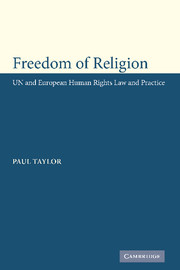Book contents
- Frontmatter
- Contents
- Foreword by David Harris
- Preface
- Table of cases, applications, and communications
- Table of treaties, declarations, and other international instruments
- List of abbreviations
- 1 Introduction
- 2 Freedom of religious choice
- 3 The scope of the forum internum beyond religious choice
- 4 The right to manifest religious belief and applicable limitations
- 5 Conclusion
- Annexes
- Bibliography
- Index
3 - The scope of the forum internum beyond religious choice
Published online by Cambridge University Press: 14 January 2010
- Frontmatter
- Contents
- Foreword by David Harris
- Preface
- Table of cases, applications, and communications
- Table of treaties, declarations, and other international instruments
- List of abbreviations
- 1 Introduction
- 2 Freedom of religious choice
- 3 The scope of the forum internum beyond religious choice
- 4 The right to manifest religious belief and applicable limitations
- 5 Conclusion
- Annexes
- Bibliography
- Index
Summary
Introduction
This chapter is concerned with establishing the outer limits of the forum internum beyond freedom of religious choice. The forum internum is taken to denote the internal and private realm of the individual against which no State interference is justified in any circumstances. It comprises not only the individual's absolute freedom of choice of religion or belief (as discussed extensively in Chapter 2) but also a range of additional freedoms (which shall be referred to as the residual scope of the forum internum). However, the precise reach of these additional freedoms is uncertain and neither the United Nations nor European institutions have developed clear or consistent principles to enable them to be formally recognised. On the contrary, when faced with the absolute character of the forum internum, jurisprudence has developed in order to subject the freedom to State regulation at the expense of the forum internum – yet it is trite law that the forum internum is subject to unqualified protection in all the key international instruments (Article 18 of the Universal Declaration on Human Rights (‘Universal Declaration’), Article 18 of the International Covenant on Civil and Political Rights (ICCPR), Article 9 of the European Convention for the Protection of Human Rights and Fundamental Freedoms (‘European Convention) and Article 1(1) of the Declaration on the Elimination of all Forms of Intolerance and of Discrimination Based on Religion or Belief (1981 Declaration).
- Type
- Chapter
- Information
- Freedom of ReligionUN and European Human Rights Law and Practice, pp. 115 - 202Publisher: Cambridge University PressPrint publication year: 2005
- 1
- Cited by

